Reflection on Team Building Skills Application and Theories Used
VerifiedAdded on 2023/01/10
|9
|1669
|71
Report
AI Summary
This report provides a comprehensive reflection on team building skills, essential for effective people management. It begins with an introduction highlighting the importance of managing people and the significance of team building skills. The literature review covers Belbin's team roles, categorizing them into thought-oriented, action-oriented, and people-oriented roles, and Tuckman's stages of team development, outlining the forming, storming, norming, performing, and adjourning phases. The report then applies these theories to a workplace scenario, detailing the author's experience as a team leader in a marketing team. It describes how team members adopted different roles and how the team utilized cooperative and collaborative practices to achieve goals. The report further analyzes the team's dynamics using Gibb's reflective cycle, examining the stages of forming, storming, norming, performing, and adjourning. Each stage is described in terms of the situation, feelings, evaluation, analysis, conclusion, and action plan, providing insights into the challenges and successes of the team. The conclusion emphasizes the critical role of team building skills in transforming a team into an effective unit and enabling leaders to maximize the potential of their team members. The report includes references to relevant literature and an appendix with Gibb's reflective cycle model.
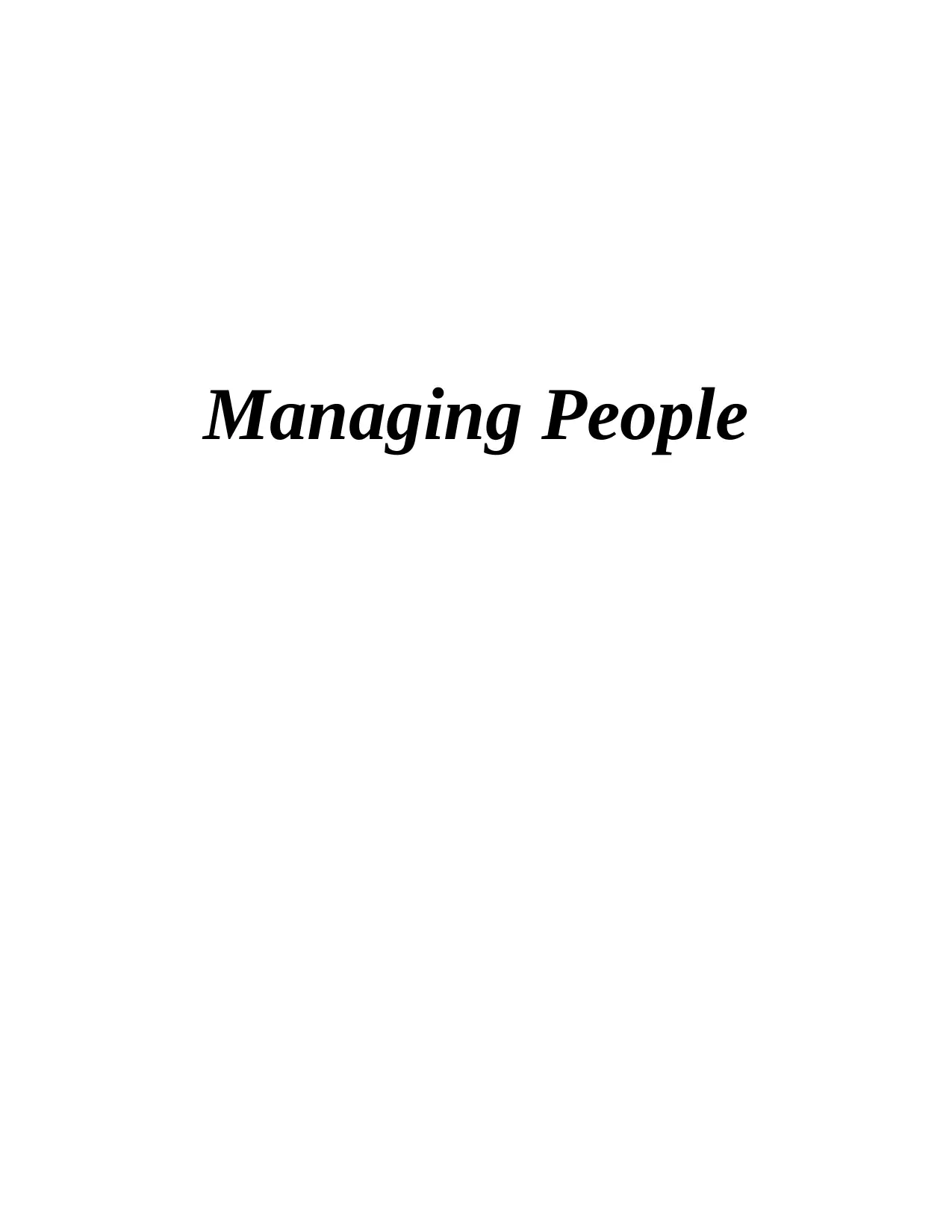
Managing People
Paraphrase This Document
Need a fresh take? Get an instant paraphrase of this document with our AI Paraphraser
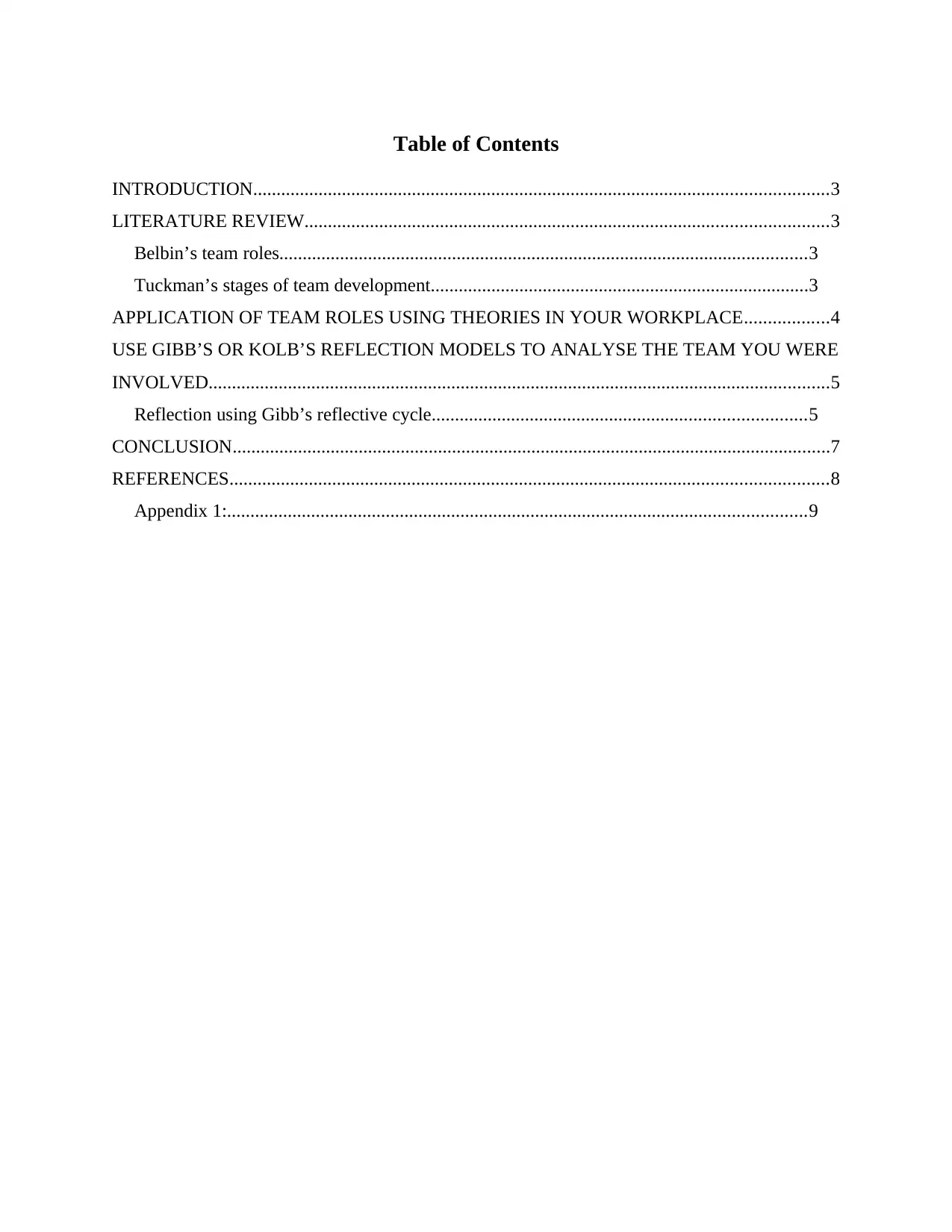
Table of Contents
INTRODUCTION...........................................................................................................................3
LITERATURE REVIEW................................................................................................................3
Belbin’s team roles.................................................................................................................3
Tuckman’s stages of team development.................................................................................3
APPLICATION OF TEAM ROLES USING THEORIES IN YOUR WORKPLACE..................4
USE GIBB’S OR KOLB’S REFLECTION MODELS TO ANALYSE THE TEAM YOU WERE
INVOLVED.....................................................................................................................................5
Reflection using Gibb’s reflective cycle................................................................................5
CONCLUSION................................................................................................................................7
REFERENCES................................................................................................................................8
Appendix 1:............................................................................................................................9
INTRODUCTION...........................................................................................................................3
LITERATURE REVIEW................................................................................................................3
Belbin’s team roles.................................................................................................................3
Tuckman’s stages of team development.................................................................................3
APPLICATION OF TEAM ROLES USING THEORIES IN YOUR WORKPLACE..................4
USE GIBB’S OR KOLB’S REFLECTION MODELS TO ANALYSE THE TEAM YOU WERE
INVOLVED.....................................................................................................................................5
Reflection using Gibb’s reflective cycle................................................................................5
CONCLUSION................................................................................................................................7
REFERENCES................................................................................................................................8
Appendix 1:............................................................................................................................9
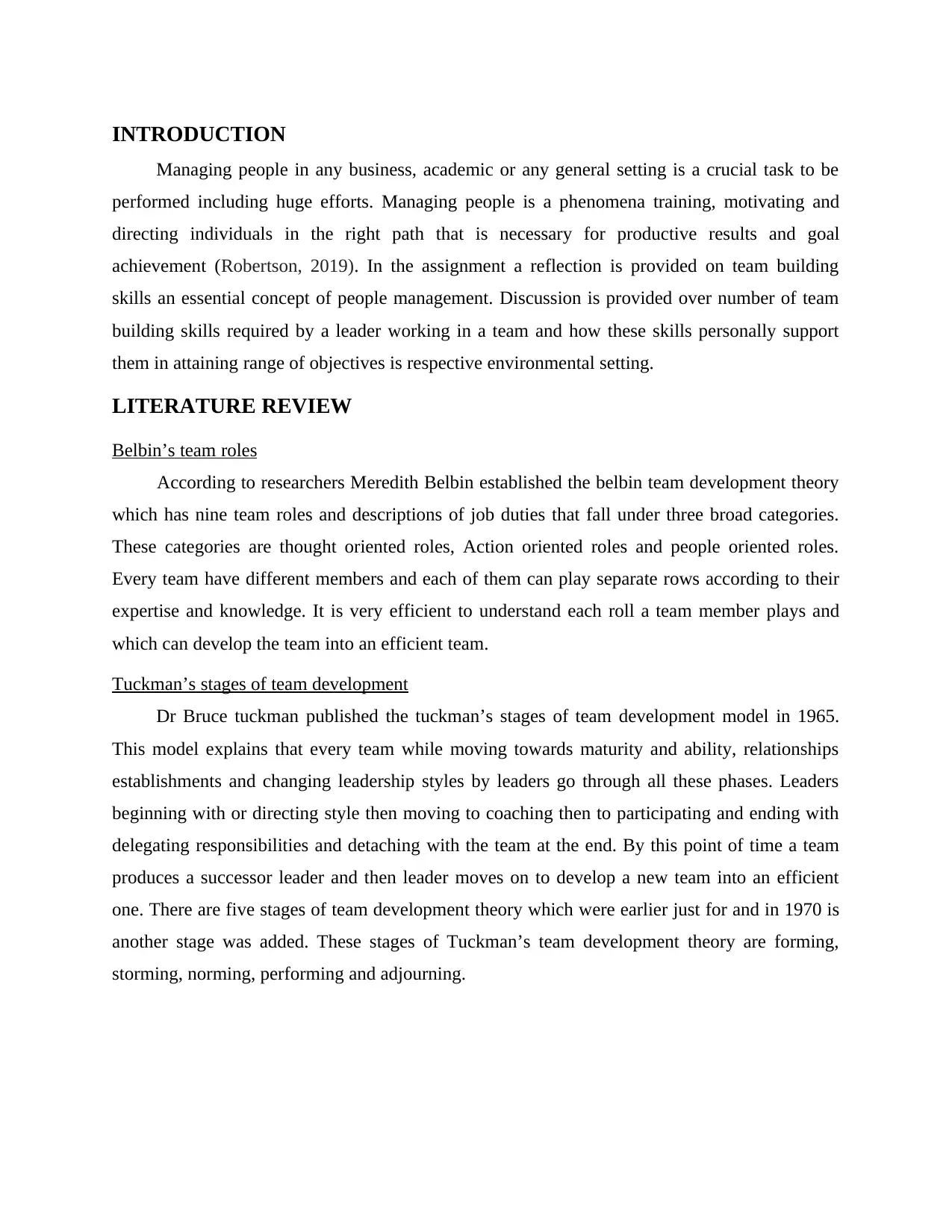
INTRODUCTION
Managing people in any business, academic or any general setting is a crucial task to be
performed including huge efforts. Managing people is a phenomena training, motivating and
directing individuals in the right path that is necessary for productive results and goal
achievement (Robertson, 2019). In the assignment a reflection is provided on team building
skills an essential concept of people management. Discussion is provided over number of team
building skills required by a leader working in a team and how these skills personally support
them in attaining range of objectives is respective environmental setting.
LITERATURE REVIEW
Belbin’s team roles
According to researchers Meredith Belbin established the belbin team development theory
which has nine team roles and descriptions of job duties that fall under three broad categories.
These categories are thought oriented roles, Action oriented roles and people oriented roles.
Every team have different members and each of them can play separate rows according to their
expertise and knowledge. It is very efficient to understand each roll a team member plays and
which can develop the team into an efficient team.
Tuckman’s stages of team development
Dr Bruce tuckman published the tuckman’s stages of team development model in 1965.
This model explains that every team while moving towards maturity and ability, relationships
establishments and changing leadership styles by leaders go through all these phases. Leaders
beginning with or directing style then moving to coaching then to participating and ending with
delegating responsibilities and detaching with the team at the end. By this point of time a team
produces a successor leader and then leader moves on to develop a new team into an efficient
one. There are five stages of team development theory which were earlier just for and in 1970 is
another stage was added. These stages of Tuckman’s team development theory are forming,
storming, norming, performing and adjourning.
Managing people in any business, academic or any general setting is a crucial task to be
performed including huge efforts. Managing people is a phenomena training, motivating and
directing individuals in the right path that is necessary for productive results and goal
achievement (Robertson, 2019). In the assignment a reflection is provided on team building
skills an essential concept of people management. Discussion is provided over number of team
building skills required by a leader working in a team and how these skills personally support
them in attaining range of objectives is respective environmental setting.
LITERATURE REVIEW
Belbin’s team roles
According to researchers Meredith Belbin established the belbin team development theory
which has nine team roles and descriptions of job duties that fall under three broad categories.
These categories are thought oriented roles, Action oriented roles and people oriented roles.
Every team have different members and each of them can play separate rows according to their
expertise and knowledge. It is very efficient to understand each roll a team member plays and
which can develop the team into an efficient team.
Tuckman’s stages of team development
Dr Bruce tuckman published the tuckman’s stages of team development model in 1965.
This model explains that every team while moving towards maturity and ability, relationships
establishments and changing leadership styles by leaders go through all these phases. Leaders
beginning with or directing style then moving to coaching then to participating and ending with
delegating responsibilities and detaching with the team at the end. By this point of time a team
produces a successor leader and then leader moves on to develop a new team into an efficient
one. There are five stages of team development theory which were earlier just for and in 1970 is
another stage was added. These stages of Tuckman’s team development theory are forming,
storming, norming, performing and adjourning.
⊘ This is a preview!⊘
Do you want full access?
Subscribe today to unlock all pages.

Trusted by 1+ million students worldwide
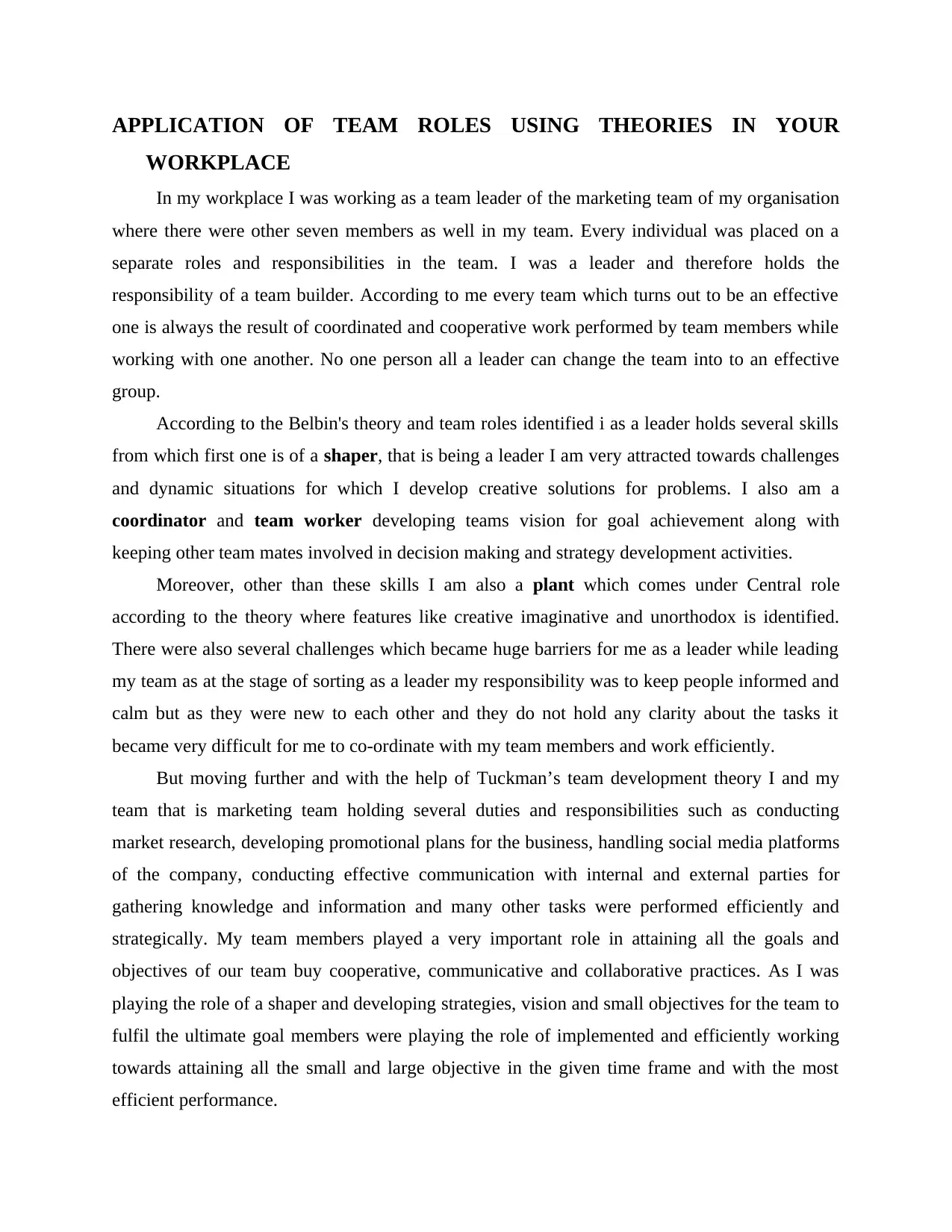
APPLICATION OF TEAM ROLES USING THEORIES IN YOUR
WORKPLACE
In my workplace I was working as a team leader of the marketing team of my organisation
where there were other seven members as well in my team. Every individual was placed on a
separate roles and responsibilities in the team. I was a leader and therefore holds the
responsibility of a team builder. According to me every team which turns out to be an effective
one is always the result of coordinated and cooperative work performed by team members while
working with one another. No one person all a leader can change the team into to an effective
group.
According to the Belbin's theory and team roles identified i as a leader holds several skills
from which first one is of a shaper, that is being a leader I am very attracted towards challenges
and dynamic situations for which I develop creative solutions for problems. I also am a
coordinator and team worker developing teams vision for goal achievement along with
keeping other team mates involved in decision making and strategy development activities.
Moreover, other than these skills I am also a plant which comes under Central role
according to the theory where features like creative imaginative and unorthodox is identified.
There were also several challenges which became huge barriers for me as a leader while leading
my team as at the stage of sorting as a leader my responsibility was to keep people informed and
calm but as they were new to each other and they do not hold any clarity about the tasks it
became very difficult for me to co-ordinate with my team members and work efficiently.
But moving further and with the help of Tuckman’s team development theory I and my
team that is marketing team holding several duties and responsibilities such as conducting
market research, developing promotional plans for the business, handling social media platforms
of the company, conducting effective communication with internal and external parties for
gathering knowledge and information and many other tasks were performed efficiently and
strategically. My team members played a very important role in attaining all the goals and
objectives of our team buy cooperative, communicative and collaborative practices. As I was
playing the role of a shaper and developing strategies, vision and small objectives for the team to
fulfil the ultimate goal members were playing the role of implemented and efficiently working
towards attaining all the small and large objective in the given time frame and with the most
efficient performance.
WORKPLACE
In my workplace I was working as a team leader of the marketing team of my organisation
where there were other seven members as well in my team. Every individual was placed on a
separate roles and responsibilities in the team. I was a leader and therefore holds the
responsibility of a team builder. According to me every team which turns out to be an effective
one is always the result of coordinated and cooperative work performed by team members while
working with one another. No one person all a leader can change the team into to an effective
group.
According to the Belbin's theory and team roles identified i as a leader holds several skills
from which first one is of a shaper, that is being a leader I am very attracted towards challenges
and dynamic situations for which I develop creative solutions for problems. I also am a
coordinator and team worker developing teams vision for goal achievement along with
keeping other team mates involved in decision making and strategy development activities.
Moreover, other than these skills I am also a plant which comes under Central role
according to the theory where features like creative imaginative and unorthodox is identified.
There were also several challenges which became huge barriers for me as a leader while leading
my team as at the stage of sorting as a leader my responsibility was to keep people informed and
calm but as they were new to each other and they do not hold any clarity about the tasks it
became very difficult for me to co-ordinate with my team members and work efficiently.
But moving further and with the help of Tuckman’s team development theory I and my
team that is marketing team holding several duties and responsibilities such as conducting
market research, developing promotional plans for the business, handling social media platforms
of the company, conducting effective communication with internal and external parties for
gathering knowledge and information and many other tasks were performed efficiently and
strategically. My team members played a very important role in attaining all the goals and
objectives of our team buy cooperative, communicative and collaborative practices. As I was
playing the role of a shaper and developing strategies, vision and small objectives for the team to
fulfil the ultimate goal members were playing the role of implemented and efficiently working
towards attaining all the small and large objective in the given time frame and with the most
efficient performance.
Paraphrase This Document
Need a fresh take? Get an instant paraphrase of this document with our AI Paraphraser
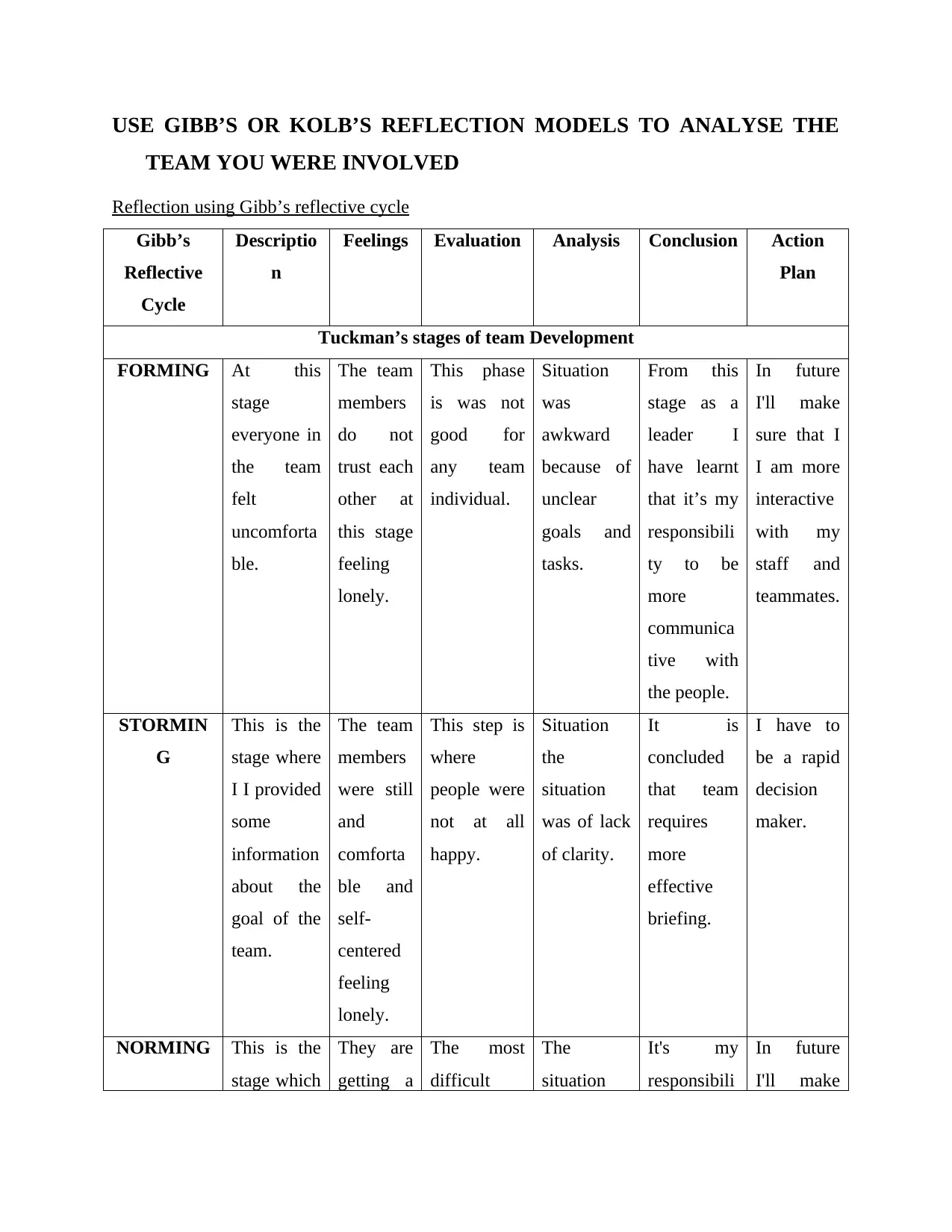
USE GIBB’S OR KOLB’S REFLECTION MODELS TO ANALYSE THE
TEAM YOU WERE INVOLVED
Reflection using Gibb’s reflective cycle
Gibb’s
Reflective
Cycle
Descriptio
n
Feelings Evaluation Analysis Conclusion Action
Plan
Tuckman’s stages of team Development
FORMING At this
stage
everyone in
the team
felt
uncomforta
ble.
The team
members
do not
trust each
other at
this stage
feeling
lonely.
This phase
is was not
good for
any team
individual.
Situation
was
awkward
because of
unclear
goals and
tasks.
From this
stage as a
leader I
have learnt
that it’s my
responsibili
ty to be
more
communica
tive with
the people.
In future
I'll make
sure that I
I am more
interactive
with my
staff and
teammates.
STORMIN
G
This is the
stage where
I I provided
some
information
about the
goal of the
team.
The team
members
were still
and
comforta
ble and
self-
centered
feeling
lonely.
This step is
where
people were
not at all
happy.
Situation
the
situation
was of lack
of clarity.
It is
concluded
that team
requires
more
effective
briefing.
I have to
be a rapid
decision
maker.
NORMING This is the
stage which
They are
getting a
The most
difficult
The
situation
It's my
responsibili
In future
I'll make
TEAM YOU WERE INVOLVED
Reflection using Gibb’s reflective cycle
Gibb’s
Reflective
Cycle
Descriptio
n
Feelings Evaluation Analysis Conclusion Action
Plan
Tuckman’s stages of team Development
FORMING At this
stage
everyone in
the team
felt
uncomforta
ble.
The team
members
do not
trust each
other at
this stage
feeling
lonely.
This phase
is was not
good for
any team
individual.
Situation
was
awkward
because of
unclear
goals and
tasks.
From this
stage as a
leader I
have learnt
that it’s my
responsibili
ty to be
more
communica
tive with
the people.
In future
I'll make
sure that I
I am more
interactive
with my
staff and
teammates.
STORMIN
G
This is the
stage where
I I provided
some
information
about the
goal of the
team.
The team
members
were still
and
comforta
ble and
self-
centered
feeling
lonely.
This step is
where
people were
not at all
happy.
Situation
the
situation
was of lack
of clarity.
It is
concluded
that team
requires
more
effective
briefing.
I have to
be a rapid
decision
maker.
NORMING This is the
stage which
They are
getting a
The most
difficult
The
situation
It's my
responsibili
In future
I'll make
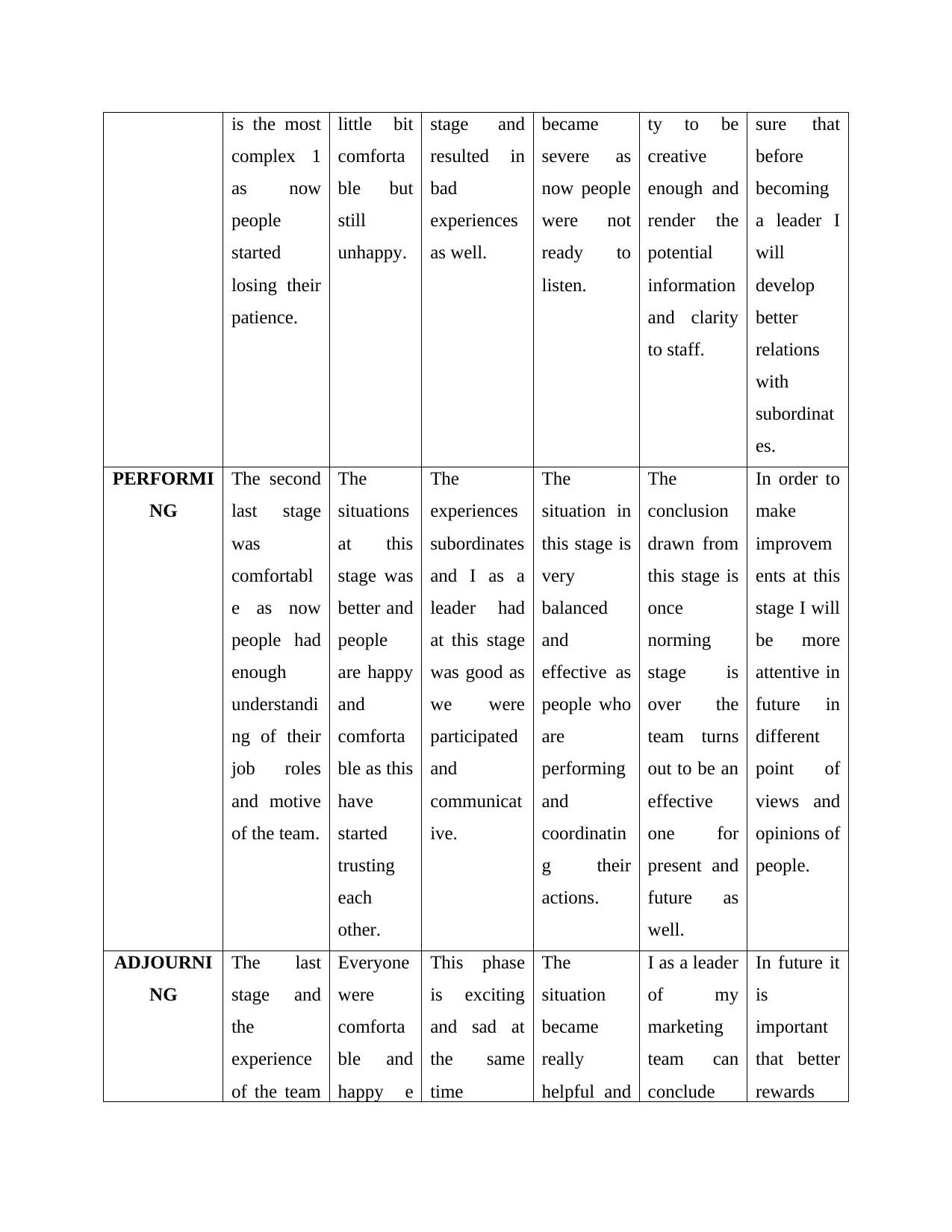
is the most
complex 1
as now
people
started
losing their
patience.
little bit
comforta
ble but
still
unhappy.
stage and
resulted in
bad
experiences
as well.
became
severe as
now people
were not
ready to
listen.
ty to be
creative
enough and
render the
potential
information
and clarity
to staff.
sure that
before
becoming
a leader I
will
develop
better
relations
with
subordinat
es.
PERFORMI
NG
The second
last stage
was
comfortabl
e as now
people had
enough
understandi
ng of their
job roles
and motive
of the team.
The
situations
at this
stage was
better and
people
are happy
and
comforta
ble as this
have
started
trusting
each
other.
The
experiences
subordinates
and I as a
leader had
at this stage
was good as
we were
participated
and
communicat
ive.
The
situation in
this stage is
very
balanced
and
effective as
people who
are
performing
and
coordinatin
g their
actions.
The
conclusion
drawn from
this stage is
once
norming
stage is
over the
team turns
out to be an
effective
one for
present and
future as
well.
In order to
make
improvem
ents at this
stage I will
be more
attentive in
future in
different
point of
views and
opinions of
people.
ADJOURNI
NG
The last
stage and
the
experience
of the team
Everyone
were
comforta
ble and
happy e
This phase
is exciting
and sad at
the same
time
The
situation
became
really
helpful and
I as a leader
of my
marketing
team can
conclude
In future it
is
important
that better
rewards
complex 1
as now
people
started
losing their
patience.
little bit
comforta
ble but
still
unhappy.
stage and
resulted in
bad
experiences
as well.
became
severe as
now people
were not
ready to
listen.
ty to be
creative
enough and
render the
potential
information
and clarity
to staff.
sure that
before
becoming
a leader I
will
develop
better
relations
with
subordinat
es.
PERFORMI
NG
The second
last stage
was
comfortabl
e as now
people had
enough
understandi
ng of their
job roles
and motive
of the team.
The
situations
at this
stage was
better and
people
are happy
and
comforta
ble as this
have
started
trusting
each
other.
The
experiences
subordinates
and I as a
leader had
at this stage
was good as
we were
participated
and
communicat
ive.
The
situation in
this stage is
very
balanced
and
effective as
people who
are
performing
and
coordinatin
g their
actions.
The
conclusion
drawn from
this stage is
once
norming
stage is
over the
team turns
out to be an
effective
one for
present and
future as
well.
In order to
make
improvem
ents at this
stage I will
be more
attentive in
future in
different
point of
views and
opinions of
people.
ADJOURNI
NG
The last
stage and
the
experience
of the team
Everyone
were
comforta
ble and
happy e
This phase
is exciting
and sad at
the same
time
The
situation
became
really
helpful and
I as a leader
of my
marketing
team can
conclude
In future it
is
important
that better
rewards
⊘ This is a preview!⊘
Do you want full access?
Subscribe today to unlock all pages.

Trusted by 1+ million students worldwide
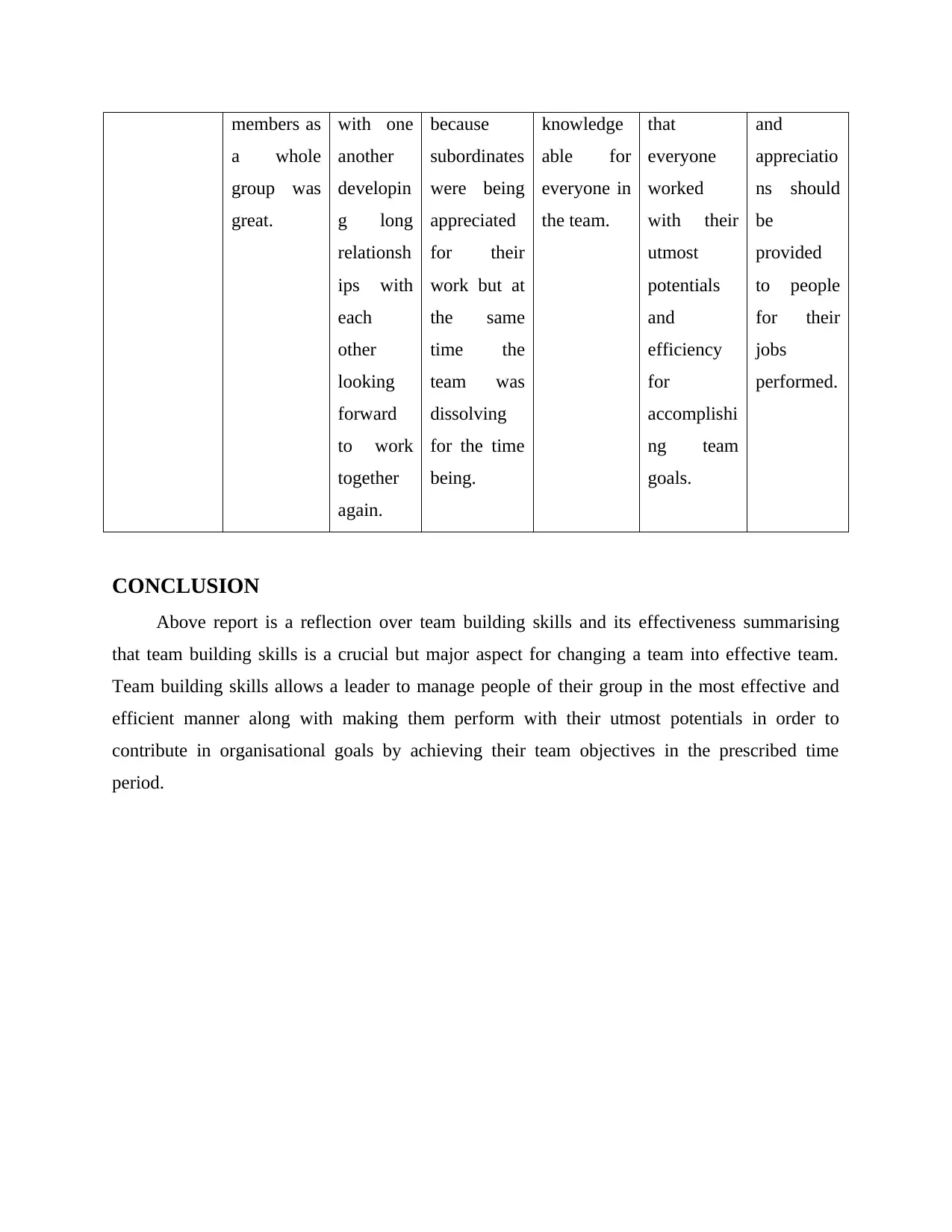
members as
a whole
group was
great.
with one
another
developin
g long
relationsh
ips with
each
other
looking
forward
to work
together
again.
because
subordinates
were being
appreciated
for their
work but at
the same
time the
team was
dissolving
for the time
being.
knowledge
able for
everyone in
the team.
that
everyone
worked
with their
utmost
potentials
and
efficiency
for
accomplishi
ng team
goals.
and
appreciatio
ns should
be
provided
to people
for their
jobs
performed.
CONCLUSION
Above report is a reflection over team building skills and its effectiveness summarising
that team building skills is a crucial but major aspect for changing a team into effective team.
Team building skills allows a leader to manage people of their group in the most effective and
efficient manner along with making them perform with their utmost potentials in order to
contribute in organisational goals by achieving their team objectives in the prescribed time
period.
a whole
group was
great.
with one
another
developin
g long
relationsh
ips with
each
other
looking
forward
to work
together
again.
because
subordinates
were being
appreciated
for their
work but at
the same
time the
team was
dissolving
for the time
being.
knowledge
able for
everyone in
the team.
that
everyone
worked
with their
utmost
potentials
and
efficiency
for
accomplishi
ng team
goals.
and
appreciatio
ns should
be
provided
to people
for their
jobs
performed.
CONCLUSION
Above report is a reflection over team building skills and its effectiveness summarising
that team building skills is a crucial but major aspect for changing a team into effective team.
Team building skills allows a leader to manage people of their group in the most effective and
efficient manner along with making them perform with their utmost potentials in order to
contribute in organisational goals by achieving their team objectives in the prescribed time
period.
Paraphrase This Document
Need a fresh take? Get an instant paraphrase of this document with our AI Paraphraser
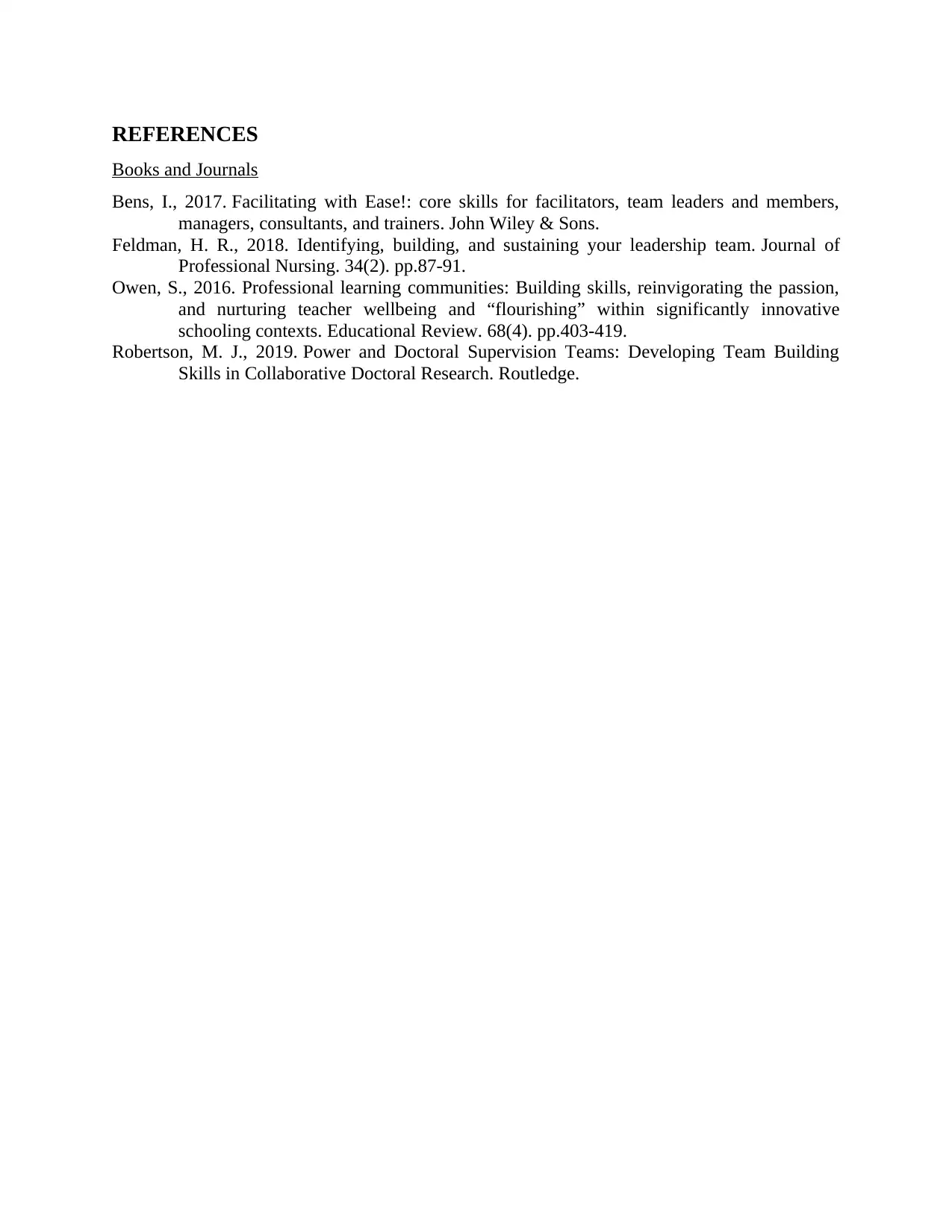
REFERENCES
Books and Journals
Bens, I., 2017. Facilitating with Ease!: core skills for facilitators, team leaders and members,
managers, consultants, and trainers. John Wiley & Sons.
Feldman, H. R., 2018. Identifying, building, and sustaining your leadership team. Journal of
Professional Nursing. 34(2). pp.87-91.
Owen, S., 2016. Professional learning communities: Building skills, reinvigorating the passion,
and nurturing teacher wellbeing and “flourishing” within significantly innovative
schooling contexts. Educational Review. 68(4). pp.403-419.
Robertson, M. J., 2019. Power and Doctoral Supervision Teams: Developing Team Building
Skills in Collaborative Doctoral Research. Routledge.
Books and Journals
Bens, I., 2017. Facilitating with Ease!: core skills for facilitators, team leaders and members,
managers, consultants, and trainers. John Wiley & Sons.
Feldman, H. R., 2018. Identifying, building, and sustaining your leadership team. Journal of
Professional Nursing. 34(2). pp.87-91.
Owen, S., 2016. Professional learning communities: Building skills, reinvigorating the passion,
and nurturing teacher wellbeing and “flourishing” within significantly innovative
schooling contexts. Educational Review. 68(4). pp.403-419.
Robertson, M. J., 2019. Power and Doctoral Supervision Teams: Developing Team Building
Skills in Collaborative Doctoral Research. Routledge.
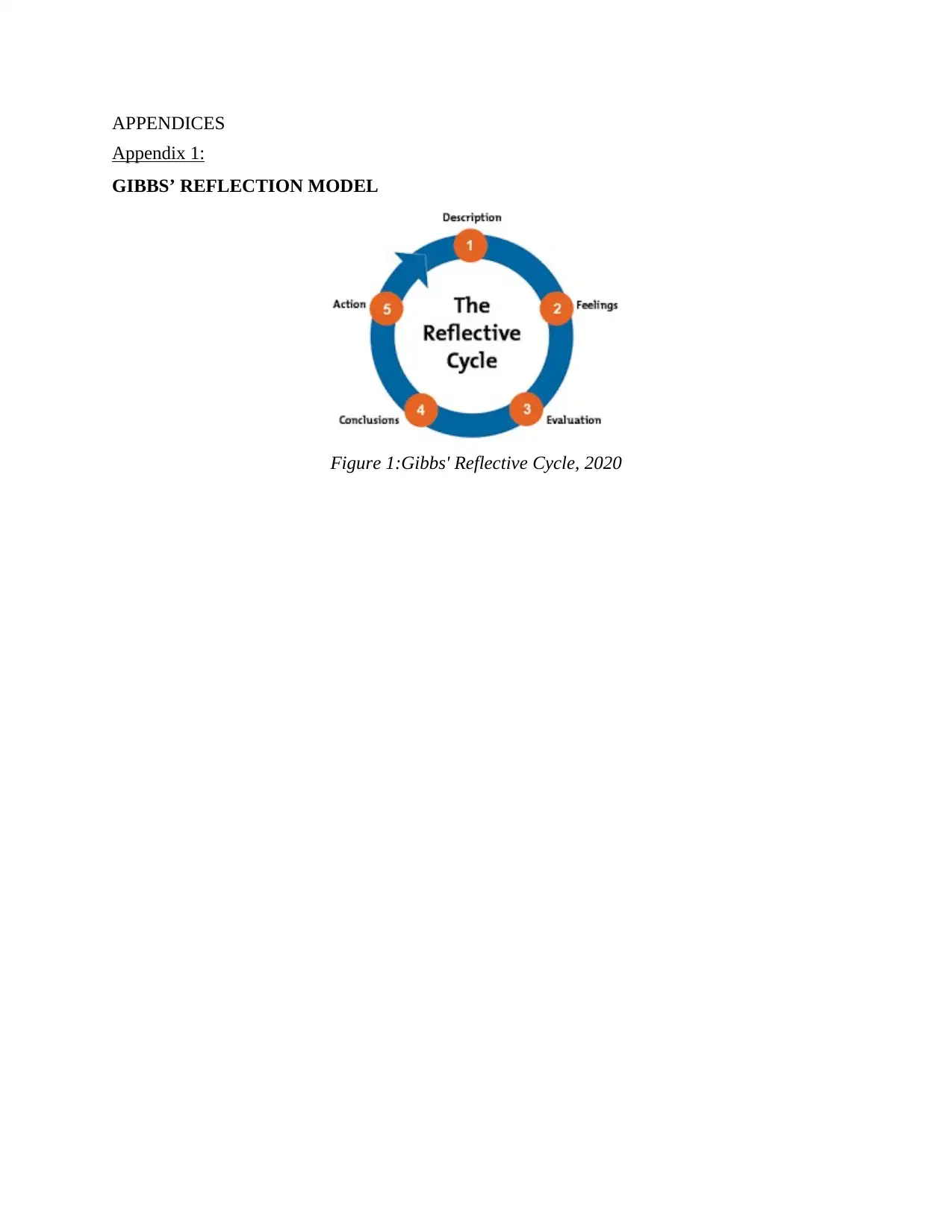
APPENDICES
Appendix 1:
GIBBS’ REFLECTION MODEL
Figure 1:Gibbs' Reflective Cycle, 2020
Appendix 1:
GIBBS’ REFLECTION MODEL
Figure 1:Gibbs' Reflective Cycle, 2020
⊘ This is a preview!⊘
Do you want full access?
Subscribe today to unlock all pages.

Trusted by 1+ million students worldwide
1 out of 9
Related Documents
Your All-in-One AI-Powered Toolkit for Academic Success.
+13062052269
info@desklib.com
Available 24*7 on WhatsApp / Email
![[object Object]](/_next/static/media/star-bottom.7253800d.svg)
Unlock your academic potential
Copyright © 2020–2026 A2Z Services. All Rights Reserved. Developed and managed by ZUCOL.





